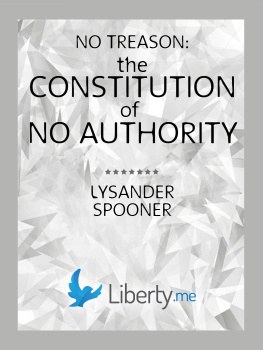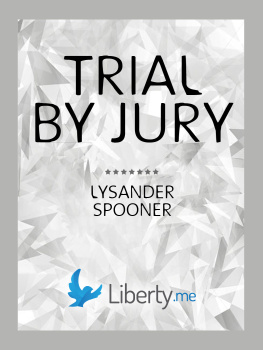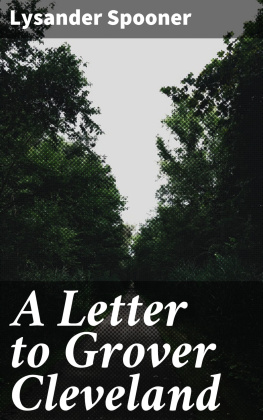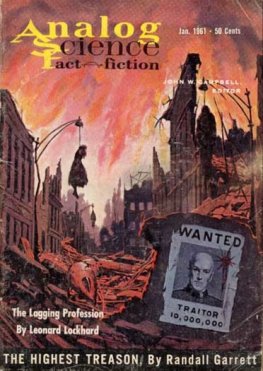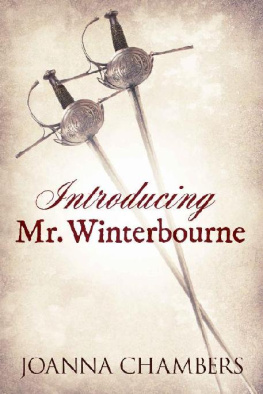Lysander Spooner - No Treason
Here you can read online Lysander Spooner - No Treason full text of the book (entire story) in english for free. Download pdf and epub, get meaning, cover and reviews about this ebook. year: 2013, publisher: Liberty.me, genre: Politics. Description of the work, (preface) as well as reviews are available. Best literature library LitArk.com created for fans of good reading and offers a wide selection of genres:
Romance novel
Science fiction
Adventure
Detective
Science
History
Home and family
Prose
Art
Politics
Computer
Non-fiction
Religion
Business
Children
Humor
Choose a favorite category and find really read worthwhile books. Enjoy immersion in the world of imagination, feel the emotions of the characters or learn something new for yourself, make an fascinating discovery.
- Book:No Treason
- Author:
- Publisher:Liberty.me
- Genre:
- Year:2013
- Rating:5 / 5
- Favourites:Add to favourites
- Your mark:
- 100
- 1
- 2
- 3
- 4
- 5
No Treason: summary, description and annotation
We offer to read an annotation, description, summary or preface (depends on what the author of the book "No Treason" wrote himself). If you haven't found the necessary information about the book — write in the comments, we will try to find it.
No Treason — read online for free the complete book (whole text) full work
Below is the text of the book, divided by pages. System saving the place of the last page read, allows you to conveniently read the book "No Treason" online for free, without having to search again every time where you left off. Put a bookmark, and you can go to the page where you finished reading at any time.
Font size:
Interval:
Bookmark:
The Constitution has no inherent authority or obligation. It has no authority or obligation at all, unless as a contract between man and man. And it does not so much as even purport to be a contract between persons now existing. It purports, at most, to be only a contract between persons living eighty years ago. And it can be supposed to have been a contract then only between persons who had already come to years of discretion, so as to be competent to make reasonable and obligatory contracts. Furthermore, we know, historically, that only a small portion even of the people then existing were consulted on the subject, or asked, or permitted to express either their consent or dissent in any formal manner. Those persons, if any, who did give their consent formally, are all dead now. Most of them have been dead forty, fifty, sixty, or seventy years. And the Constitution, so far as it was their contract, died with them. They had no natural power or right to make it obligatory upon their children. It is not only plainly impossible, in the nature of things, that they could bind their posterity, but they did not even attempt to bind them. That is to say, the instrument does not purport to be an agreement between any body but the people then existing; nor does it, either expressly or impliedly, assert any right, power, or disposition, on their part, to bind anybody but themselves. Let us see. Its language is:
We, the people of the United States (that is, the people then existing in the United States), in order to farm a more perfect union, insure domestic tranquility, provide for the common defense, promote the general welfare, and secure the blessings of liberty to ourselves ana our posterity, do ordain and establish this Constitution for the United States of America.
It is plain, in the first place, that this language, as an agreement, purports to be only what it at most really was, viz., a contract between the people then existing; and, of necessity, binding, as a contract, only upon those then existing. In the second place, the language neither expresses nor implies that they had any intention or desire, nor that they imagined they had any right or power, to bind their posterity to live under it. It does not say that their posterity will, shall, or must live under it. It only says, in effect, that their hopes and motives in adopting it were that it might prove useful to their posterity, as well as to themselves, by promoting their union, safety, tranquility, liberty, etc.
Suppose an agreement were entered into, in this form:
We, the people of Boston, agree to maintain a fort on Governors Island, to protect ourselves and our posterity against invasion.
This agreement, as an agreement, would clearly bind nobody but the people then existing. Secondly, it would assert no right, power, or disposition, on their part, to compel their posterity to maintain such a fort. It would only indicate that the supposed welfare of their posterity was one of the motives that induced the original parties to enter into the agreement.
When a man says he is building a house for himself and his posterity, he does not mean to be understood as saying that he has any thought of binding them, nor is it to be inferred that he is so foolish as to imagine that he has any right or power to bind them, to live in it. So far as they are concerned, he only means to be understood as saying that his hopes and motives, in building it, are that they, or at least some of them, may find it for their happiness to live in it.
So when a man says he is planting a tree for himself and his posterity, he does not mean to be understood as saying that he has any thought of compelling them, nor is it to be inferred that he is such a simpleton as to imagine that he has any right or power to compel them, to eat the fruit. So far as they are concerned, he only means to say that his hopes and motives, in planting the tree, are that its fruit may be agreeable to them.
So it was with those who originally adopted the Constitution. Whatever may have been their personal intentions, the legal meaning of their language, so far as their posterity was concerned, simply was, that their hopes and motives, in entering into the agreement, were that it might prove useful and acceptable to their posterity; that it might promote their union, safety, tranquility, and welfare; and that it might tend to secure to them the blessings of liberty. The language does not assert nor at all imply, any right, power, or disposition, on the part of the original parties to the agreement, to compel their posterity to live under it. If they had intended to bind their posterity to live under it, they should have said that their object was, not to secure to them the blessings of liberty, but to make slaves of them; for if their posterity are bound to live under it, they are nothing less than the slaves of their foolish, tyrannical, and dead grandfathers.
It cannot be said that the Constitution formed the people of the United States, for all time, into a corporation. It does not speak of the people as a corporation, but as individuals. A corporation does not describe itself as we, nor as people, nor as ourselves. Nor does a corporation, in legal language, have any posterity. It supposes itself to have, and speaks of itself as having, perpetual existence, as a single individuality.
Moreover, no body of men, existing at any one time, have the power to create a perpetual corporation. A corporation can become practically perpetual only by the voluntary accession of new members, as the old ones die off. But for this voluntary accession of new members, the corporation necessarily dies with the death of those who originally composed it.
Legally speaking, therefore, there is, in the Constitution, nothing that professes or attempts to bind the posterity of those who established it.
If, then, those who established the Constitution, had no power to bind, and did not attempt to bind, their posterity, the question arises, whether their posterity have bound themselves. If they have done so, they can have done so in only one or both of these two ways, viz., by voting, and paying taxes.
Let us consider these two matters, voting and tax paying, separately. And first of voting.
All the voting that has ever taken place under the Constitution, has been of such a kind that it not only did not pledge the whole people to support the Constitution, but it did not even pledge any one of them to do so, as the following considerations show.
1. In the very nature of things, the act of voting could bind nobody but the actual voters. But owing to the property qualifications required, it is probable that, during the first twenty or thirty years under the Constitution, not more than one-tenth, fifteenth, or perhaps twentieth of the whole population (black and white, men, women, and minors) were permitted to vote. Consequently, so far as voting was concerned, not more than one-tenth, fifteenth, or twentieth of those then existing, could have incurred any obligation to support the Constitution.
At the present time, it is probable that not more than one-sixth of the whole population are permitted to vote. Consequently, so far as voting is concerned, the other five-sixths can have given no pledge that they will support the Constitution.
2. Of the one-sixth that are permitted to vote, probably not more than two-thirds (about one-ninth of the whole population) have usually voted. Many never vote at all. Many vote only once in two, three, five, or ten years, in periods of great excitement.
No one, by voting, can be said to pledge himself for any longer period than that for which he votes. If, for example, I vote for an officer who is to hold his office for only a year, I cannot be said to have thereby pledged myself to support the government beyond that term. Therefore, on the ground of actual voting, it probably cannot be said that more than one-ninth or one-eighth, of the whole population are usually under any pledge to support the Constitution.
Font size:
Interval:
Bookmark:
Similar books «No Treason»
Look at similar books to No Treason. We have selected literature similar in name and meaning in the hope of providing readers with more options to find new, interesting, not yet read works.
Discussion, reviews of the book No Treason and just readers' own opinions. Leave your comments, write what you think about the work, its meaning or the main characters. Specify what exactly you liked and what you didn't like, and why you think so.

